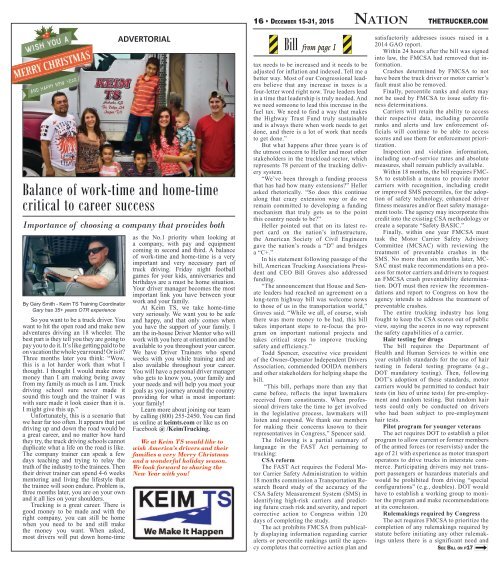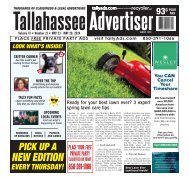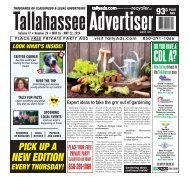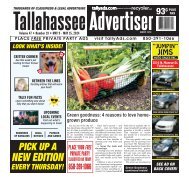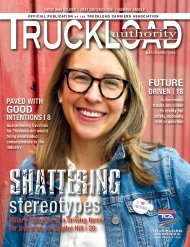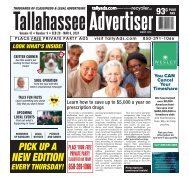Create successful ePaper yourself
Turn your PDF publications into a flip-book with our unique Google optimized e-Paper software.
So you want to be a truck driver. You<br />
want to hit the open road and make new<br />
adventures driving an 18 wheeler. <strong>The</strong><br />
best part is they tell you they are going to<br />
pay you to do it. It’s like getting paid to be<br />
on vacation the whole year round! Or is it?<br />
Three months later you think: “Wow,<br />
this is a lot harder work than what I<br />
thought. I thought I would make more<br />
money than I am making being away<br />
from my family as much as I am. Truck<br />
driving school sure never made it<br />
sound this tough and the trainer I was<br />
with sure made it look easier than it is.<br />
I might give this up.”<br />
Unfortunately, this is a scenario that<br />
we hear far too often. It appears that just<br />
driving up and down the road would be<br />
a great career, and no matter how hard<br />
they try, the truck driving schools cannot<br />
duplicate what a life on the road is like.<br />
<strong>The</strong> company trainer can speak a few<br />
days teaching and trying to relay the<br />
truth of the industry to the trainees. <strong>The</strong>n<br />
their driver trainer can spend 4-6 weeks<br />
mentoring and living the lifestyle that<br />
the trainee will soon endure. Problem is,<br />
three months later, you are on your own<br />
and it all lies on your shoulders.<br />
Trucking is a great career. <strong>The</strong>re is<br />
good money to be made and with the<br />
right company, you can still be home<br />
when you need to be and still make<br />
the money you want. When asked,<br />
most drivers will put down home-time<br />
ADVERTORIAL<br />
Balance of work-time and home-time<br />
critical to career success<br />
Importance of choosing a company that provides both<br />
By Gary Smith - Keim TS Training Coordinator<br />
Gary has 35+ years OTR experience<br />
as the No.1 priority when looking at<br />
a company, with pay and equipment<br />
coming in second and third. A balance<br />
of work-time and home-time is a very<br />
important and very necessary part of<br />
truck driving. Friday night football<br />
games for your kids, anniversaries and<br />
birthdays are a must be home situation.<br />
Your driver manager becomes the most<br />
important link you have between your<br />
work and your family.<br />
At Keim TS, we take home-time<br />
very seriously. We want you to be safe<br />
and happy, and that only comes when<br />
you have the support of your family. I<br />
am the in-house Driver Mentor who will<br />
work with you here at orientation and be<br />
available to you throughout your career.<br />
We have Driver Trainers who spend<br />
weeks with you while training and are<br />
also available throughout your career.<br />
You will have a personal driver manager<br />
who gets to know you, your family and<br />
your needs and will help you meet your<br />
goals as you journey around the country<br />
providing for what is most important:<br />
your family!<br />
Learn more about joining our team<br />
by calling (800) 255-2450. You can find<br />
us online at keimts.com or like us on<br />
Facebook @ /KeimTrucking.<br />
We at Keim TS would like to<br />
wish America’s drivers and their<br />
families a very Merry Christmas<br />
and a wonderful holiday season.<br />
We look forward to sharing the<br />
New Year with you!<br />
16 • <strong>December</strong> <strong>15</strong>-<strong>31</strong>, 20<strong>15</strong> Nation<br />
b Bill from page 1 b<br />
tax needs to be increased and it needs to be<br />
adjusted for inflation and indexed. Tell me a<br />
better way. Most of our Congressional leaders<br />
believe that any increase in taxes is a<br />
four-letter word right now. True leaders lead<br />
in a time that leadership is truly needed. And<br />
we need someone to lead this increase in the<br />
fuel tax. We need to find a way that makes<br />
the Highway Trust Fund truly sustainable<br />
and is always there when work needs to get<br />
done, and there is a lot of work that needs<br />
to get done.”<br />
But what happens after three years is of<br />
the utmost concern to Heller and most other<br />
stakeholders in the truckload sector, which<br />
represents 78 percent of the trucking delivery<br />
system.<br />
“We’ve been through a funding process<br />
that has had how many extensions?” Heller<br />
asked rhetorically. “So does this continue<br />
along that crazy extension way or do we<br />
remain committed to developing a funding<br />
mechanism that truly gets us to the point<br />
this country needs to be?”<br />
Heller pointed out that on its latest report<br />
card on the nation’s infrastructure,<br />
the American Society of Civil Engineers<br />
gave the nation’s roads a “D” and bridges<br />
a “C+.”<br />
In his statement following passage of the<br />
bill, American Trucking Associations President<br />
and CEO Bill Graves also addressed<br />
funding.<br />
“<strong>The</strong> announcement that House and Senate<br />
leaders had reached an agreement on a<br />
long-term highway bill was welcome news<br />
to those of us in the transportation world,”<br />
Graves said. “While we all, of course, wish<br />
there was more money to be had, this bill<br />
takes important steps to re-focus the program<br />
on important national projects and<br />
takes critical steps to improve trucking<br />
safety and efficiency.”<br />
Todd Spencer, executive vice president<br />
of the Owner-Operator Independent Drivers<br />
Association, commended OOIDA members<br />
and other stakeholders for helping shape the<br />
bill.<br />
“This bill, perhaps more than any that<br />
came before, reflects the input lawmakers<br />
received from constituents. When professional<br />
drivers take the time to get involved<br />
in the legislative process, lawmakers will<br />
listen and respond. We thank our members<br />
for making their concerns known to their<br />
representatives in Congress,” Spencer said.<br />
<strong>The</strong> following is a partial summary of<br />
language in the FAST Act pertaining to<br />
trucking:<br />
CSA reform<br />
<strong>The</strong> FAST Act requires the Federal Motor<br />
Carrier Safety Administration to within<br />
18 months commission a Transportation Research<br />
Board study of the accuracy of the<br />
CSA Safety Measurement System (SMS) in<br />
identifying high-risk carriers and predicting<br />
future crash risk and severity, and report<br />
corrective action to Congress within 120<br />
days of completing the study.<br />
<strong>The</strong> act prohibits FMCSA from publically<br />
displaying information regarding carrier<br />
alerts or percentile rankings until the agency<br />
completes that corrective action plan and<br />
thetrucker.com<br />
satisfactorily addresses issues raised in a<br />
2014 GAO report.<br />
Within 24 hours after the bill was signed<br />
into law, the FMCSA had removed that information.<br />
Crashes determined by FMCSA to not<br />
have been the truck driver or motor carrier’s<br />
fault must also be removed.<br />
Finally, percentile ranks and alerts may<br />
not be used by FMCSA to issue safety fitness<br />
determinations.<br />
Carriers will retain the ability to access<br />
their respective data, including percentile<br />
ranks and alerts and law enforcement officials<br />
will continue to be able to access<br />
scores and use them for enforcement prioritization.<br />
Inspection and violation information,<br />
including out-of-service rates and absolute<br />
measures, shall remain publicly available.<br />
Within 18 months, the bill requires FMC-<br />
SA to establish a means to provide motor<br />
carriers with recognition, including credit<br />
or improved SMS percentiles, for the adoption<br />
of safety technology, enhanced driver<br />
fitness measures and/or fleet safety management<br />
tools. <strong>The</strong> agency may incorporate this<br />
credit into the existing CSA methodology or<br />
create a separate “Safety BASIC.”<br />
Finally, within one year FMCSA must<br />
task the Motor Carrier Safety Advisory<br />
Committee (MCSAC) with reviewing the<br />
treatment of preventable crashes in the<br />
SMS. No more than six months later, MC-<br />
SAC must make recommendations on a process<br />
for motor carriers and drivers to request<br />
an FMCSA crash preventability determination.<br />
DOT must then review the recommendations<br />
and report to Congress on how the<br />
agency intends to address the treatment of<br />
preventable crashes.<br />
<strong>The</strong> entire trucking industry has long<br />
fought to keep the CSA scores out of public<br />
view, saying the scores in no way represent<br />
the safety capabilities of a carrier.<br />
Hair testing for drugs<br />
<strong>The</strong> bill requires the Department of<br />
Health and Human Services to within one<br />
year establish standards for the use of hair<br />
testing in federal testing programs (e.g.,<br />
DOT mandatory testing). <strong>The</strong>n, following<br />
DOT’s adoption of these standards, motor<br />
carriers would be permitted to conduct hair<br />
tests (in lieu of urine tests) for pre-employment<br />
and random testing. But random hair<br />
tests could only be conducted on drivers<br />
who had been subject to pre-employment<br />
hair tests.<br />
Pilot program for younger veterans<br />
<strong>The</strong> act requires DOT to establish a pilot<br />
program to allow current or former members<br />
of the armed forces (or reservists) under the<br />
age of 21 with experience as motor transport<br />
operators to drive trucks in interstate commerce.<br />
Participating drivers may not transport<br />
passengers or hazardous materials and<br />
would be prohibited from driving “special<br />
configurations” (e.g., doubles). DOT would<br />
have to establish a working group to monitor<br />
the program and make recommendations<br />
at its conclusion.<br />
Rulemakings required by Congress<br />
<strong>The</strong> act requires FMCSA to prioritize the<br />
completion of any rulemakings required by<br />
statute before initiating any other rulemakings<br />
unless there is a significant need and<br />
See Bill on p17 m


